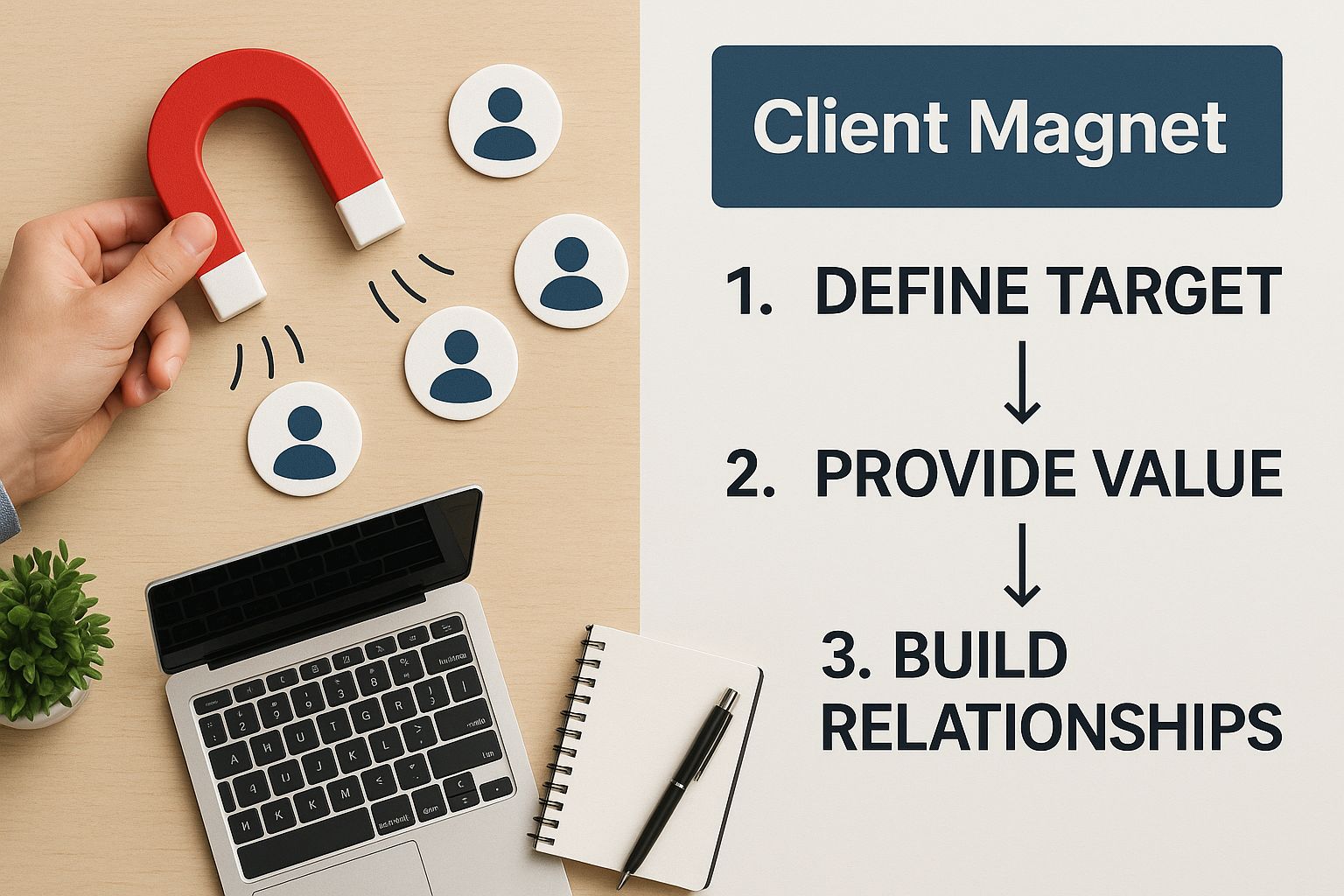Effective SEO for a consultant isn’t just about getting your website to show up on Google. It’s about building a system that automatically brings clients to your door. Think of it as transforming your website from a simple online brochure into your hardest-working, 24/7 business development tool.
This mindset changes everything. You stop chasing leads and start attracting high-quality inquiries from people who are already looking for exactly what you offer.
Why SEO Is Your Strongest Client Magnet
Let’s be honest—old-school methods like cold calling and constant networking are draining. You’re always in “sales mode,” trying to convince people they need you. A smart SEO strategy completely flips that script. It’s a system designed to bring your perfect clients directly to you, establishing you as an authority before you even have a conversation.
When a potential client types a problem into a search engine, SEO is what makes sure your website shows up with the solution. This isn’t just about getting more traffic; it’s about attracting qualified prospects who already know they have a problem and are actively seeking help. This infographic perfectly illustrates how SEO acts as a powerful magnet, pulling ideal clients toward your consulting practice.

The real power here is creating a consistent, inbound flow of leads. It fundamentally changes how you grow your business.
From Chasing Leads to Being the Authority
The heart of great SEO for consultants is a shift in perspective. You’re not just broadcasting your services anymore. Instead, you’re creating genuinely useful resources that showcase your expertise. This process naturally builds trust and cements your reputation as the go-to expert in your field.
Put yourself in your client’s shoes. Imagine they’re struggling with a specific issue and stumble upon your detailed guide on “how to reduce employee turnover in tech startups.” In that moment, you’ve already demonstrated your value. You’re no longer just another consultant pitching for work; you’re the expert who clearly understands their pain points.
For consultants, your product is your expertise. There is no better way to demonstrate that expertise at scale than by publishing helpful, optimized articles that answer the exact questions your ideal clients are asking.
This guide will give you the practical, no-fluff building blocks you need to create that client magnet for your own practice. We’ll walk through the essentials:
- Finding the Right Keywords: How to uncover the exact problems your best clients are trying to solve.
- Creating Authority-Building Content: How to develop assets that prove your expertise and build unshakable trust.
- On-Page & Technical SEO: How to make sure your website is a solid foundation for both search engines and potential clients.
- Building Your Digital Reputation: How to earn online “referrals” (backlinks) that boost your credibility and search visibility.
Mastering these areas is what takes you from being just another service provider to becoming a recognized authority.
To see how these pieces fit together, take a look at this quick overview.
How SEO Directly Impacts Your Consulting Business
This table breaks down how each core SEO activity translates into real-world business results, moving you from effort to outcome.
| SEO Pillar | Primary Goal for a Consultant | Key Business Impact |
|---|---|---|
| Keyword Research | Uncover high-intent client problems | Attract pre-qualified leads with a recognized need |
| Content Creation | Demonstrate expertise and build trust | Establish authority and shorten the sales cycle |
| On-Page Optimization | Improve user experience & search visibility | Increase website traffic and lead conversions |
| Link Building | Earn “votes of confidence” from other sites | Boost credibility and domain authority for higher rankings |
| Local SEO | Capture clients in your geographic area | Generate local leads and dominate your service area |
| Analytics & Tracking | Measure what’s working and what’s not | Make data-driven decisions to maximize your ROI |
By focusing on these pillars, you create a sustainable system for growth.
This isn’t a “get clients fast” gimmick. Good SEO is a long-term asset you’re building for your business. You invest the time to create a great piece of content once, and it can continue to generate traffic, leads, and new clients for years to come. That’s how you build a pipeline that works for you, even when you’re not.
Find the Keywords That Attract Your Ideal Clients
Let’s get one thing straight: SEO for consultants isn’t about getting the most traffic. It’s about getting the right traffic. The foundation of any solid SEO strategy is keyword research, but most consultants get it wrong. They chase broad, high-level terms and wonder why their contact form is collecting dust.
You have to stop thinking like a consultant and start thinking like a potential client with a serious problem. Forget generic terms like “management consultant” or “financial advisor.” While they seem obvious, they cast a net so wide you end up with an audience that’s completely unqualified. The goal here is surgical precision. Your perfect client isn’t just browsing for “a consultant”; they’re desperately searching for a solution to a specific, urgent business pain.
Think Problems, Not Services
This is the most important mental shift you need to make. Stop focusing on the services you offer and start focusing on the problems your clients are trying to solve. A COO struggling with a chaotic supply chain isn’t typing “logistics consultant” into Google. They’re much more likely to be searching for “how to reduce shipping delays” or “best practices for warehouse inventory management.”
These longer, more specific phrases are what we call long-tail keywords. Sure, they have lower search volume, but the intent behind them is sky-high. Someone searching for a specific problem is already halfway to hiring you.
Here’s what this looks like in the real world:
- A financial consultant goes from targeting “wealth management services” to “succession planning for family businesses.”
- A marketing consultant stops chasing “digital marketing expert” and instead targets “customer acquisition strategy for SaaS companies.”
- An IT consultant focuses on “improving data security for healthcare providers” instead of the generic “IT support services.”
This approach acts as an immediate filter. The people who land on your site are pre-qualified because you’re speaking their language and addressing the exact issue that’s keeping them up at night.
Uncovering High-Intent Keywords with Modern Tools
Once you’ve got your problem-first mindset locked in, it’s time to find the exact phrases your clients are using. You can’t just guess. SEO tools give you the hard data you need to see what people are actually searching for, how often, and how hard it will be to rank for those terms.
Tools like Ahrefs, SEMrush, or even Google’s free Keyword Planner are non-negotiable. I usually start by plugging in a “seed” keyword related to a client’s problem—like “employee turnover”—and then dig into all the related questions and terms the tool spits out.
This is what it looks like inside Ahrefs’ Keyword Explorer when you analyze a term. You can quickly see the search volume and a score for how difficult it is to rank.
This data is gold. It helps you decide where to focus your energy instead of just blindly creating content.
The real secret to effective keyword research is mapping search terms to different stages of your client’s journey. Are they just realizing they have a problem? Are they weighing their options? Or are they ready to hire someone? You need content for each stage.
For example, a search for “what is a good employee retention rate” is clearly top-of-funnel (awareness). Someone searching “employee retention strategies” is further along (consideration). And a search for “employee retention consultant for startups” means they’re ready to buy. Your keyword strategy has to cover all three.
Analyze What’s Already Working
Don’t reinvent the wheel. A huge part of my process is analyzing what’s already on the first page of Google for my target keywords. Who are you up against? Other consultants? Big agencies? Industry publications? What are they doing right?
When you’re doing this competitive analysis, look for patterns in the top-ranking content:
- What kind of content is it? Are they blog posts, long-form guides, case studies, or service pages?
- What’s the angle? Are they focused on benefits, a step-by-step process, or common mistakes to avoid?
- How deep does it go? Is it a quick overview, or is it a comprehensive, expert-level resource?
This analysis gives you a clear picture of what Google already believes is a great answer for that search query. Your job isn’t to copy it. Your job is to create something 10x better. Make your content more thorough, add unique insights from your own experience, or make it more actionable than anything else out there.
The need for this kind of strategic SEO is only growing. The Middle East & Africa (MEA) SEO software market, for instance, generated USD 4.1 billion in revenue and is on track to hit USD 8.0 billion by 2030, with a CAGR of 11.7%. This tells us that consultants everywhere, especially in business hubs like Dubai and Riyadh, are leaning heavily on SEO to stand out. You can check out more stats on the MEA digital marketing landscape on Grand View Research. This data makes one thing crystal clear: a meticulous keyword strategy is no longer a “nice-to-have”—it’s essential for survival.
Create Content That Builds Unshakable Authority
As a consultant, your expertise is everything. The real challenge, though, is proving that expertise to people who haven’t hired you yet. This is where your content strategy comes in. It’s not just about blogging; it’s about turning what you know into tangible assets that attract and pre-sell your ideal clients.
Forget pumping out generic articles just to have something new on the site. We’re talking about creating high-value resources that decision-makers actually find, read, and respect. The goal is to establish yourself as the go-to expert in your niche before a prospect even thinks about looking at a competitor.

Go Beyond Standard Blog Posts
While a steady stream of blog posts has its place, true authority is built with more substantial content. Certain formats simply resonate better with a sophisticated business audience and do a much better job of showcasing the depth of your knowledge.
Think about creating these high-impact content types:
- Deep-Dive Guides: Imagine a 3,000-word ultimate guide on a complex topic. A marketing consultant could write “The Definitive Guide to B2B Customer Journey Mapping,” complete with downloadable frameworks and templates. That’s the kind of thing people bookmark and return to.
- Insightful Case Studies: Don’t just list what you did—tell a compelling story. Frame your work as “Problem, Process, Outcome,” and walk the reader through how you transformed a client’s situation with real, measurable results.
- Data-Backed White Papers: Nothing says “thought leader” like original research. An HR consultant could survey 100 local companies on their remote work policies and publish the findings. Suddenly, you’re not just commenting on the news; you are the news.
These formats are powerful because they offer genuine, actionable value that mirrors the quality of your paid work.
For a consultant, every piece of content is an audition. It’s your chance to show, not just tell, how you solve problems. High-quality, in-depth content is the most effective way to pass that audition with flying colors.
Develop Pillar Content and Topic Clusters
The most successful content strategies aren’t random; they’re structured and intentional. The “pillar and cluster” model is perfectly suited for consultants because it organizes your expertise around your core services, making it crystal clear to both Google and potential clients what you’re all about.
Let’s say you’re a supply chain consultant and your main service is “Warehouse Optimization.” That becomes your pillar page—a comprehensive, long-form guide that covers the topic from A to Z.
From there, you build out your cluster content. These are shorter, more focused articles that explore specific sub-topics related to your pillar. For instance:
- “5 Signs Your Warehouse Layout Is Killing Efficiency”
- “How to Choose the Right Inventory Management Software”
- “Case Study: How We Reduced Picking Errors by 30%“
Each of these cluster posts links back to your main pillar page. This internal linking structure signals to Google that you have deep, authoritative knowledge on warehouse optimization. For a human reader, it creates a seamless journey to explore your expertise and builds their confidence in your ability to solve their problem. Properly structuring your site this way is a huge part of creating a semantic content network that Google understands and rewards with higher rankings.
Turn Client Work into Compelling Content
You’re already sitting on a goldmine of content ideas: your daily work. The problems you solve and the questions your clients ask are the very things your next clients are searching for online.
Start a simple document and jot down every single question a client or prospect asks you. That’s your content calendar for the next six months.
Think about a recent project. What was the core challenge? What was the unique process you used to fix it? What was the outcome? Just anonymize the client’s details, and you have a powerful case study ready to be written.
Here’s a simple framework to get you started:
- Identify a Recurring Problem: What issue keeps coming up in your client calls?
- Document Your Unique Process: How do you solve it? What are the key steps or frameworks you lean on?
- Show the Transformation: Paint a clear “before and after” picture. Use tangible metrics whenever possible to prove the impact.
By making this a habit, you’ll never run out of authentic, expert-driven content ideas. A single article, born from a real-world problem, can attract qualified leads for years to come, giving you incredible leverage and building a marketing asset that works for you 24/7.
Optimize Your Website for Local and Global Clients
Think of your website as your digital storefront. It’s where potential clients, whether they’re down the street or halfway across the world, come to see if you’re the real deal. Your job is to make sure the foundation is solid, welcoming both types of visitors and telling them—and Google—exactly what you do.
This all comes down to on-page SEO. It’s the art of arranging the signs and signals on your site so search engines understand your expertise and show you to the right people. Getting the basics right is what separates consultants who are constantly getting calls from those who are invisible online.

Nail Your On-Page SEO Essentials
Your title tags and meta descriptions are often a client’s very first impression of your business. They’re what show up in the search results, and you have just a split second to convince someone to click on your link instead of a competitor’s.
- Title Tags: This is your headline in Google. It needs to be sharp, clear, and under 60 characters. Instead of a generic title like “Services,” make it specific: “Supply Chain Optimization Consulting | Your Company Name.” It instantly tells a searcher what you do.
- Meta Descriptions: Think of this as your 160-character elevator pitch. While it won’t directly boost your rankings, a compelling description can dramatically increase clicks. Address a key pain point and hint at the solution you provide.
- Headers (H1, H2, H3): Headers give your content structure, making it easier for people to read and for search engines to understand. Your main page title must be an H1, with subheadings organized logically using H2s and H3s.
When these elements work together, they tell a consistent story to both people and search engine bots, confirming that your page has the answers they’re looking for.
Dominate Search in Your Service Area
If you serve clients in a specific city or region, local SEO is your bread and butter. It’s how you make sure that when a local business owner searches for help, your name is the first one they see. Get this right, and you can build a reliable pipeline of high-quality leads right in your backyard.
Your most powerful tool here is your Google Business Profile (GBP). It’s a free listing that lets you show up in Google Maps and the coveted “local pack” in search results.
A fully optimized Google Business Profile is like having a digital billboard in your target city. It’s often the first interaction a local prospect has with your brand, making it a critical piece of your client acquisition strategy.
To turn your GBP into a client-generating machine, you need to focus on a few key areas:
- Complete Every Section: Don’t skip anything. Fill out your services, hours, photos, and write a detailed business description that includes your keywords.
- Gather Client Reviews: Make it a habit to ask happy clients for reviews. A steady stream of positive feedback is a massive trust signal and a known ranking factor.
- Use Google Posts: Keep your profile fresh by sharing updates, articles, and special offers through the Posts feature. It shows Google you’re active and engaged.
Mastering your local presence is a foundational part of SEO for consultants who rely on geographic targeting. For a deeper dive, you can explore other guides on advanced strategies for local SEO that offer more actionable tips.
Prioritize a Mobile-First Experience
Let’s face it: your clients are busy. They’re looking for solutions on their phones while on the train, in a coffee shop, or between meetings. If your website is slow or a pain to navigate on a mobile device, you’ve already lost them.
Google now uses mobile-first indexing, which means it evaluates the mobile version of your site to determine your rankings. A clunky mobile experience isn’t just frustrating for users—it actively harms your search visibility.
This is especially true in fast-growing digital markets. In the Middle East, for example, the demand for SEO services is skyrocketing, driven by the fact that over 60% of all searches happen on mobile. Consultants in cities like Dubai and Riyadh have to build their strategies around this mobile-centric behavior to stand out. This reality highlights a universal truth for consultants everywhere: your digital office has to be flawless in the palm of your client’s hand.
Build Authority with Strategic Link Building
Think of links as the digital world’s version of a professional referral. When a respected website links to your content, it’s a powerful vote of confidence. It’s a signal to search engines that you’re a credible authority in your field. This isn’t about spammy, outdated tactics; it’s about smart networking and PR that cements your expert status.
For a consultant, effective SEO means you have to stop thinking of link building as a technical chore. It’s a high-level business development activity. Every single link you earn should come from a source that polishes your professional reputation, driving not just search rankings but also direct referral traffic from potential clients.
Focus on High-Value Digital PR
As a busy consultant, your time is your most valuable asset. The best link-building strategies are the ones that build your brand at the same time. Don’t chase dozens of low-quality links. Instead, pour your energy into securing a handful of high-impact placements that put your expertise front and center.
These are the opportunities that double as powerful PR moves, positioning you as a genuine thought leader.
Here are a few white-hat strategies that I’ve seen work exceptionally well for consultants:
- Offer Expert Commentary: Journalists and industry bloggers are constantly on the hunt for expert quotes to make their articles more credible. Use services like Help a Reporter Out (HARO) to connect with them. This is a fantastic way to land powerful links from news sites and top-tier publications.
- Be a Guest on Industry Podcasts: Find the podcasts your ideal clients actually listen to. Getting on their show as a guest lets you share your insights with a hyper-targeted audience, and almost every appearance comes with a valuable link back to your website in the show notes.
- Get Your Work Cited: Have you published unique data or a really compelling case study? Reach out to organizations that compile industry round-ups or annual reports. Having them cite your work not only builds a fantastic link but also establishes you as a primary source of information.
The Art of Personalized Outreach
Once you spot a great link opportunity, how you reach out makes all the difference. Generic, templated emails get deleted on sight. Your goal is to start a real conversation with another professional. Show them you’ve done your homework and have something of actual value to bring to the table.
For example, a successful pitch to be a podcast guest wouldn’t just say, “I’d like to be on your show.”
A much better approach is to mention a specific recent episode you enjoyed and why. Then, briefly explain how your unique take on a relevant topic would be a win for their audience, maybe even suggesting a few concrete talking points. It’s all about being helpful, not just asking for a favor.
The best link-building outreach feels less like a request and more like a collaboration. You are offering your unique expertise to help another creator make their content even better for their audience.
This completely changes the dynamic. You’re no longer just a consultant looking for an SEO boost; you’re a valuable partner offering unique insights. This approach doesn’t just have a much higher success rate—it also helps you build authentic professional relationships that can pay dividends down the road with future collaborations and client referrals.
Turn Your Best Content into a Link Magnet
Honestly, the easiest way to earn links is to create something genuinely worth linking to. This brings us back to creating that pillar content we talked about—the deep-dive guides, original research, and insightful case studies that prove you know your stuff. When you publish a resource that becomes the definitive guide on a topic, the links start to come in on their own.
Imagine a financial consultant who publishes a comprehensive, data-driven analysis of “Succession Planning Trends for Family Businesses in the UAE.” This isn’t just another blog post; it’s a valuable, linkable asset.
Other financial bloggers, industry news sites, and even university business programs would have a compelling reason to link to it whenever they discuss that topic. The secret is to create content so thorough and insightful that it becomes a go-to resource, making the decision to link to it a no-brainer for others in your space.
Measure What Matters for Business Growth
It’s easy to get excited about a surge in website traffic. But let’s be honest: traffic is just a vanity metric if those visitors aren’t turning into paying clients. As a consultant, your time is your most valuable asset, so you can’t afford to pour it into marketing that doesn’t show a real return.
This is where we tie your SEO work directly to your bottom line. We’re moving beyond simply tracking clicks and pageviews to measuring what actually grows your consulting practice: client acquisition.
Setting Up Your Measurement Foundation
You’ll need two essential tools for this job: Google Analytics 4 (GA4) and Google Search Console. They’re both free, incredibly powerful, and absolutely non-negotiable if you’re serious about getting clients from search.
- Google Search Console (GSC) is your window into how Google sees your site. It tells you which keywords you’re actually ranking for, how many people are clicking on your links, and flags any technical hiccups that could be hurting your performance.
- Google Analytics 4 (GA4) picks up where GSC leaves off, showing you what people do once they arrive on your website. It tracks how they interact with your pages, how long they stick around, and—most importantly—when they take a valuable action.
Getting them set up is pretty straightforward. Once they’re talking to each other, you get the full story, from the moment someone types a query into Google to the second they hit “submit” on your contact form.
The biggest mindset shift for consultants measuring SEO is to focus on outcomes, not just activity. Stop obsessing over your rank for a hundred different keywords and start counting how many qualified consultations you book from organic search each month.
When you adopt this business-first perspective, your whole approach to analytics becomes simpler and much more powerful.
Identifying Your Core Business KPIs
For a consultant, most of the data you’ll find in GA4 is just noise. You need to cut through it and zero in on the handful of Key Performance Indicators (KPIs) that signal a potential new client is knocking on your door.
I recommend focusing your attention on these three things:
- Ranking Improvements for “Money” Keywords: Keep a close eye on your rankings for those high-intent, problem-aware keywords we talked about earlier. Seeing your site climb the ranks for “succession planning for family businesses” means a whole lot more than a random traffic spike from a vague, low-value term.
- Growth in Lead Form Submissions: This is your primary conversion. You need to set up event tracking in GA4 to register a conversion every single time someone fills out your “Book a Consultation” or “Contact Us” form. This is your most direct measure of lead generation.
- Qualified Consultations Booked: Now we get to the real prize. Of all those form submissions, how many turned into actual, qualified sales conversations? This is the ultimate benchmark of your SEO success.
Tracking these specific metrics draws a straight line from your content and SEO efforts directly to your revenue. If you want to be sure your site is technically primed to convert this traffic, it’s often worth getting a professional website SEO audit.
The demand for this kind of data-driven proof is only growing. Look at the trends—the digital marketing analytics market in the Middle East & Africa alone was valued at USD 90.36 million and is expected to grow at a CAGR of 20.6% through 2031. This shows a massive appetite for consultants who can back up their strategies with hard numbers.
By measuring what truly matters, you stop “doing SEO” and start building a predictable, scalable engine for acquiring new clients.
Frequently Asked Questions About SEO for Consultants
Diving into SEO for your consulting business is bound to bring up some questions. It’s a big topic, and it’s smart to get clear on the fundamentals before you start. Here are my straight-to-the-point answers to the questions I hear most often from consultants.
How Long Does SEO Take to Work for a Consultant?
This is the big one, isn’t it? The honest answer is that SEO is a marathon, not a sprint. It’s a long-term play that builds a real business asset.
You might start to see some flickers of life in a few months, but for the kind of results that bring in a steady stream of qualified leads, you should plan on four to six months of consistent work.
Building real authority in Google’s eyes and ranking for the keywords that matter takes time. The whole point of SEO for consultants is to create a reliable client-attraction system that works for you years down the road, not just a quick hit of traffic. Think of it like planting a tree—it takes time to grow, but the eventual payoff is huge.
The patience you put into SEO pays off with compounding returns. The work you do in month six keeps bringing in leads in year two, making it one of the most powerful marketing investments a consultant can make.
Should I Do SEO Myself or Hire an Agency?
The classic “DIY or delegate” question. The right choice really comes down to your time, your budget, and how competitive your particular field is.
Many consultants can absolutely handle their own SEO, especially by sticking to the core practices we’ve covered here. If you consistently publish high-quality content, get your on-page basics right, and build up your local signals, you can see fantastic results. The best part of the DIY approach is that your unique voice and expertise are baked into everything you create.
However, if your time is better spent on billable client work, or if you’re trying to rank for really tough national keywords, bringing in a pro is a smart investment. An agency or a seasoned SEO freelancer can speed up the process and handle the technical heavy lifting, freeing you up to do what you do best: consult.
What Is More Important: Local SEO or Content Marketing?
This one’s simple: it completely depends on where your clients come from. There’s no single right answer, so you have to match your SEO strategy to your business model.
- For locally-focused consultants: If your clients are all in a specific city or region, local SEO is everything. Getting your Google Business Profile dialed in, racking up local reviews, and going after city-specific keywords will give you the best bang for your buck. It’s priority number one.
- For national or global consultants: If you can work with anyone, anywhere, then content marketing becomes your most powerful weapon. This is where you write the definitive articles, guides, and case studies that prove you’re the expert. You’re attracting clients who want the best, not just the closest.
Ultimately, a fully developed strategy will use both. But when you’re just starting, put your energy where your ideal clients are already looking.
Ready to turn your website into a powerful client-acquisition engine? The team at Invocom provides strategic SEO and end-to-end digital services that accelerate growth for businesses like yours. Learn more about our solutions at https://invocom.me.





